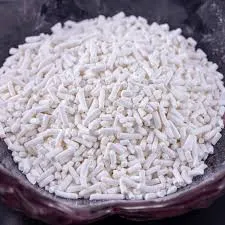
e341 food additive
Understanding E341 A Key Food Additive
Food additives play a crucial role in the modern food industry. They enhance flavor, color, texture, and shelf life, making our food more palatable and appealing. One such additive is E341, widely recognized in the food sector. This article explores what E341 is, its uses, safety concerns, and its significance in the food industry.
What is E341?
E341 refers to a group of phosphates, specifically calcium phosphates, that are used as food additives. The term E number is a code assigned by the European Union (EU) to identify food additives that are permitted for use in the food industry. E341 can exist in several forms, including monocalcium phosphate, dicalcium phosphate, and tricalcium phosphate. These are organic compounds derived from phosphoric acid and are primarily used as emulsifiers, anti-caking agents, and nutrient supplements.
Uses of E341
E341 is predominantly utilized in processed foods for various purposes
1. Leavening Agent E341 is commonly used in baking products as a leavening agent. It reacts with baking soda, producing carbon dioxide gas, which helps dough rise and creates a lighter texture in baked goods.
2. Emulsifier This additive can stabilize mixtures of oil and water. It is often included in salad dressings, sauces, and mayonnaise, enhancing the texture and ensuring a consistent product.
3. Nutritional Supplement E341 is a source of calcium and phosphorus, essential minerals for bone health. As such, it is often added to fortified foods, particularly products aimed at children or individuals with calcium deficiencies.
e341 food additive

4. Anti-caking Agent E341 also prevents clumping in powdered products like cheese powder, spices, and dry mixes, ensuring a smooth flow and improved usability.
Safety and Regulations
E341 has been evaluated for safety by regulatory bodies around the world, including the European Food Safety Authority (EFSA) and the U.S. Food and Drug Administration (FDA). According to these organizations, E341 is generally recognized as safe (GRAS) when used within specified limits. The acceptable daily intake of phosphates, including those in E341, is not usually a concern for most individuals consuming a balanced diet.
However, excessive intake of phosphates can lead to health issues, particularly for individuals with kidney disease, as their bodies may struggle to excrete excess phosphates. Some studies have also raised concerns about the potential link between high phosphate levels and certain chronic diseases, such as cardiovascular disease. Therefore, it is essential to consume processed foods containing E341 in moderation.
The Significance of E341 in the Food Industry
The presence of E341 in foods is a testament to the advancements in food technology and processing. It allows manufacturers to create products that are not only appealing but also safer and more nutritious. The use of E341 contributes to the long shelf life of products, reducing food waste and benefiting both consumers and producers economically.
Moreover, as consumers become increasingly health-conscious, the role of food additives like E341 may evolve. The growing trend towards cleaner labels and natural ingredients may prompt food companies to seek alternatives or modify their formulations. However, E341 remains essential in specific applications, particularly in the baking and processed food sectors, where its functional benefits are undeniable.
Conclusion
E341 is a multifunctional food additive that plays a significant role in enhancing the qualities of various food products. While safety assessments indicate that it is safe for consumption, awareness of individual dietary needs is vital. As consumers increasingly seek healthier options, the future of additives in our food, including E341, will likely adapt and evolve. Understanding these components helps us make informed food choices and appreciate the science behind the foods we consume.
-
Buy High-Quality Trichloroisocyanuric Acid for Sale | TCCA 90% SupplierNewsAug.30,2025
-
Pure Sodium Dichloroisocyanurate Dihydrate | Powerful DisinfectantNewsAug.29,2025
-
Industrial Chemicals: Quality & Purity for Every IndustryNewsAug.28,2025
-
Nitrile Rubber Honoring Strict Production StandardsNewsAug.22,2025
-
Aspartame Ingredients Honoring Food Safety ValuesNewsAug.22,2025
-
Fertilizer for Balanced Plant NutritionNewsAug.22,2025
-
Cyanide Gold Processing with High Purity AdditivesNewsAug.22,2025
Hebei Tenger Chemical Technology Co., Ltd. focuses on the chemical industry and is committed to the export service of chemical raw materials.
-

view more DiethanolisopropanolamineIn the ever-growing field of chemical solutions, diethanolisopropanolamine (DEIPA) stands out as a versatile and important compound. Due to its unique chemical structure and properties, DEIPA is of interest to various industries including construction, personal care, and agriculture. -

view more TriisopropanolamineTriisopropanolamine (TIPA) alkanol amine substance, is a kind of alcohol amine compound with amino and alcohol hydroxyl, and because of its molecules contains both amino and hydroxyl. -

view more Tetramethyl Thiuram DisulfideTetramethyl thiuram disulfide, also known as TMTD, is a white to light-yellow powder with a distinct sulfur-like odor. It is soluble in organic solvents such as benzene, acetone, and ethyl acetate, making it highly versatile for use in different formulations. TMTD is known for its excellent vulcanization acceleration properties, which makes it a key ingredient in the production of rubber products. Additionally, it acts as an effective fungicide and bactericide, making it valuable in agricultural applications. Its high purity and stability ensure consistent performance, making it a preferred choice for manufacturers across various industries.





